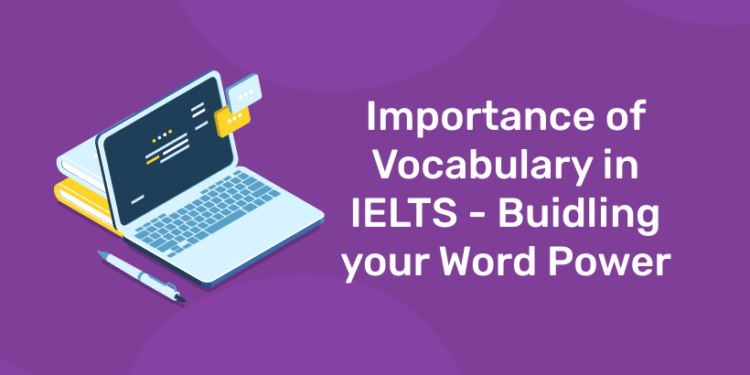Table of Contents
The IELTS exam is a test of your English language proficiency, and vocabulary is an essential component of this test. A good vocabulary helps you to understand and express ideas better, which is crucial for success in the IELTS exam. In this blog, we will discuss the importance of vocabulary in IELTS exam and provide tips on how to build your word power. Discover the pivotal role of vocabulary in IELTS success. Explore how a strong vocabulary enhances reading comprehension, listening skills, writing proficiency, and speaking fluency. Learn why diverse word usage is vital for higher scores and gain valuable tips to improve your language skills for the IELTS exam.
Vocabulary is an integral part of the IELTS exam. It is essential for both the reading and writing sections of the exam. The reading section tests your ability to understand the meaning of words in context, while the writing section tests your ability to use a range of vocabulary accurately and appropriately. A good vocabulary can also help you to understand the listening and speaking sections of the exam better.
Importance of Vocabulary in IELTS
Vocabulary plays a crucial role in the International English Language Testing System (IELTS) exam, and its importance cannot be overstated. Here are some key reasons why a strong vocabulary is essential for success in the IELTS exam:
- Understanding Reading Passages: In the IELTS Reading section, you will encounter various texts, including academic articles, newspapers, and magazines. A rich vocabulary will enable you to comprehend the passages more effectively, allowing you to identify key information and answer questions accurately.
- Effective Listening Skills: In the IELTS Listening section, you will hear a range of accents and topics. A broad vocabulary will help you understand different word choices and context, ensuring you don’t miss important information.
- Expressing Ideas Clearly in Writing: The IELTS Writing tasks require candidates to convey their ideas clearly and coherently. A diverse vocabulary allows you to use a wide range of words and phrases, leading to more sophisticated and precise writing.
- Speaking Fluently and Confidently: In the IELTS Speaking test, a varied vocabulary helps you express yourself fluently and confidently. It enables you to describe experiences, express opinions, and discuss various topics more effectively.
- Avoiding Repetition: A strong vocabulary allows you to avoid repetitive language, making your responses and essays more engaging and interesting to the examiners.
- Higher Lexical Resource Score: The IELTS scoring system includes a “Lexical Resource” criterion that assesses a candidate’s vocabulary usage. A broader range of vocabulary and the ability to use words accurately and appropriately can lead to a higher score in this category.
- Handling Different Topics: IELTS covers a wide range of topics, from science and technology to environment and society. Having a good vocabulary across various subjects will enable you to address different topics with confidence.
- Synonyms and Paraphrasing: In some IELTS tasks, you may need to paraphrase sentences or use synonyms to avoid repetition. A strong vocabulary makes it easier to rephrase sentences while retaining the original meaning.
Tips for Building Your Vocabulary:
Read Widely: Reading is one of the most effective ways to build your vocabulary. Read books, newspapers, and magazines, and pay attention to new words that you come across. Try to understand the meaning of these words in context.
Learn New Words Every Day: Make it a habit to learn new words every day. You can use apps like Quizlet or Memrise to learn new words and practice them regularly.
Use Flashcards: Flashcards are an excellent tool for learning new words. Write the word on one side of the card and the meaning on the other side. Go through the cards regularly to reinforce your learning.
Watch English Movies and TV Shows: Watching English movies and TV shows is a great way to improve your vocabulary. Pay attention to new words and phrases and try to use them in your conversations.
Use a Thesaurus: A thesaurus is a useful tool for finding synonyms and antonyms of words. It can help you to improve your writing skills by using a range of vocabulary.
Q- How much Vocabulary is enough for IELTS?
1: Most university students ........................ on campus in their first year.
Vocabulary size of around 10,000 words is fine. Using Mnemonics, you can easily learn words and opt for a perfect IELTS score. A lot of lists are available online to run through a bunch of words that vouch for a good IELTS score. You’ll find many vocabulary words lists online for a good IELTS score. Why those lists won’t work?
- English is more than just those 1000 words
- Learning meaning & the usage of words isn’t possible for the human brain.
- Vocabulary section doesn’t check your memory.
You’ll lose some marks in IELTS exam if:
- Wrong words are used
- Wrong words, you use adjective instead of a noun.
- No use of synonyms
Let’s try a different approach than learning millions of words without knowing their context.
Ace Your IELTS Exam with Confidence!
Unlock your potential with our expert-led IELTS preparation course. Achieve your dream score and open doors to global opportunities!
Start Your IELTS Journey Today!crack ielts exam ! enroll to get free demo video !
How can I improve IELTS Vocabulary
Tip #1:
Listen to English Audio/video everyday
A lot of you might think this is a funny idea, but sit back and chew on it. How did you learn your mother-tongue while you were a kid? After 2 weeks we tend to remember: 20% of what we hear than what we read. So listening to audio or watching English video is a better option to improve vocabulary. Watch a movie or listen to ted talks or audiobooks about anything that interests you.
Tip 2:
Read a book Everyday
The second best option after Listening is Reading. After 2 weeks we tend to remember: 10% of what we read. So listening to audio or watching English video is a better option to improve vocabulary. Reading helps us remember spellings, contexts and new words. Learning new words while you are reading a book/novel/newspaper of your interests is a great way with effective results. Merely reading for 5 to 10 minutes every day, you can bring your vocabulary skill to a pro-level.
Tip 3:
Context is important
How many words you can cram right? To remember something in the long term, it’s important to know the meaning of that particular word. Plus, Google is the best resource to do that.
Tip 4: Make your own mnemonics
This is the best way to learn vocabulary, using mnemonics, you can learn more than 1000 words easily without cramming. So, find the meaning of a word via Google or dictionary, then create your own mnemonics. This Trick will help you a lot in scoring good marks in IELTS test.
Tip 5: Regular Vocabulary Test
If you’ll find many pdf of Previous year Vocabulary words asked in IELTS test.
Tip 6: Recheck words you use
Make sure you are learning from the right source. There are various online platforms or app that can help you in this.
Tip 7:Try Vocabulary building apps
Conclusion
To improve your vocabulary for the IELTS exam, practice reading a variety of materials, listening to different accents, learning new words and phrases, and using them in your speaking and writing practice. Aim to understand not just the definitions of words but also their usage in different contexts. Regular practice and exposure to diverse vocabulary will enhance your language skills and boost your performance in the IELTS exam.
| Related Links | |
| All About IELTS Exam | IELTS Reading Practice Test |
| IELTS Listening Practice Test | IELTS Writing Practice Test |
| IELTS Speaking Practice Test | OET vs IELTS |









